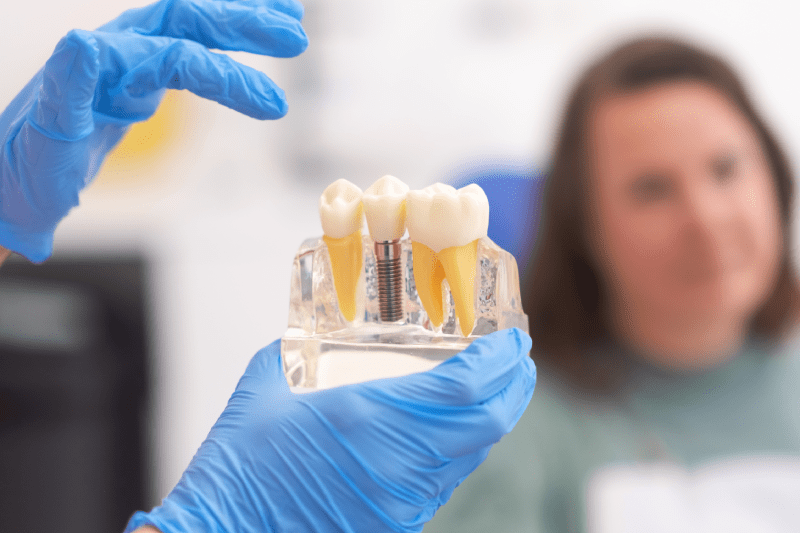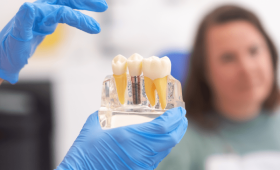What Are the Main Factors Affecting Dental Implant Prices in Dubrovnik?
Dental implant costs in Dubrovnik depend on many factors, from the brand and quality of the implant used to the complexity of the treatment. Globally recognized and high-standard implant brands (such as Straumann, Nobel Biocare) are more expensive.
Whether the treatment will be a single implant or a full-mouth restoration, the bone density in the area where the implant will be placed, and whether additional surgical procedures such as sinus lifting or bone grafting are required, also directly affect the price. In addition, the location of the clinic, its technological infrastructure, and the dentist’s experience play an important role in pricing.
What Is the Average Price of a Single Dental Implant in Dubrovnik?
The average cost of a single dental implant in Dubrovnik varies depending on the general living and operating costs in Croatia. Generally, a price range of 600 Euro to 1,500 Euro may be a case for the surgical placement of a single implant. This price usually only covers the implant itself and the surgical placement procedure. The cost of the superstructure (abutment and crown) is not included in this price, which further increases the total budget. Therefore, it is very important to ask for a clear quote covering all stages when getting a price.
What Are the Most Preferred Cities to Get Dental Implants in Croatia?
Croatia is a country that is becoming increasingly popular for dental tourism, and besides Dubrovnik, cities like Zagreb, Split, and Rijeka are also frequently preferred for dental treatment. Zagreb, being the capital, has the highest number of clinics and specialists. Coastal cities like Split and Rijeka, on the other hand, offer ideal options for those who want to combine a holiday with their treatment experience. Each city may have different pricing policies and areas of expertise within itself.
What Are the Main Materials Used in Dental Implant Treatment?
The most commonly used material in dental implant treatment is titanium. Since titanium is a biocompatible metal, it is easily accepted by the body and integrates with the bone. This feature ensures that the implant is long-lasting and strong. Titanium has been used safely in dentistry for many years. In addition, for patients with metal allergies or high aesthetic concerns, zirconium implants can also be preferred. Zirconium offers an appearance closer to the natural tooth color.
How Long Does the Total Dental Implant Treatment Process Take?
Dental implant treatment generally consists of two main stages and can take several months in total. In the first stage, the implant is surgically placed in the jawbone, and a healing period of 3 to 6 months is expected for the implant to fuse with the bone (osseointegration). In the second stage, the treatment is completed by placing the abutment and porcelain crown on the implant. This process may vary depending on the patient’s general health, bone quality, and healing speed.
Is Dental Implant Treatment a Painful Procedure?
Dental implant treatment is a painless procedure as it is performed under local anesthesia. The patient does not feel any pain or discomfort during the procedure. A slight pain or swelling may occur for a few days after the procedure, but this can usually be controlled with simple painkillers and passes quickly. Most patients find the implant operation even less painful than a tooth extraction.
Who Can Get Dental Implant Treatment?
Dental implant treatment can be applied to individuals whose jawbone development is complete, who are in good general health, and who pay attention to oral hygiene. Having sufficient bone volume and density is of critical importance for the success of the implant. Implant treatment may not be suitable for patients with serious health problems such as uncontrolled diabetes or bone loss. The dentist determines the patient’s suitability for the implant with a detailed examination and X-ray.
How Do Additional Procedures Like Bone Grafting or Sinus Lifting Affect the Cost?
Additional procedures such as bone grafting or sinus lifting may become mandatory for patients who do not have sufficient bone volume for implant placement. These additional surgical procedures increase the complexity and duration of the treatment, which significantly increases the total cost. The cost of bone grafting varies depending on the material used and the size of the procedure. Such additional procedures should be taken into account when planning the total treatment budget.

What Is the Lifespan of Dental Implants?
Dental implants can be used for a lifetime when applied correctly and with proper oral hygiene. Scientific studies show that the ten-year success rates of dental implants are over 95%. Regular brushing, flossing, and going to the dentist for a check-up every six months are of great importance to extend the life of the implant. Staying away from habits such as smoking and alcohol also helps protect implant health.
What Is the Cost of a Full-Mouth Implant Treatment?
Full-mouth implant treatment is usually offered with concepts such as “All-on-4” or “All-on-6”. In these treatments, a fixed prosthesis is placed on several implants. The cost of a full-mouth implant treatment in Dubrovnik can range from 7,000 Euro to 20,000 Euro, depending on the number of implants, the brand, and the type of prosthesis. This cost may vary depending on the patient’s specific condition and treatment plan.
Why Is Croatia a Popular Choice for Dental Treatment?
Croatia has become an increasingly popular destination for dental treatment due to the combination of affordable prices and high-quality service. Since the country is a member of the European Union, there are high clinical standards and hygiene rules. Dentists use modern technologies and constantly update their professional development. In addition, cities like Dubrovnik offer a great opportunity to combine the treatment process with a pleasant holiday experience.
Do the Low Prices in Croatia Mean a Lack of Quality?
Dental implant prices in Croatia may be more affordable than in Western European countries, but this does not mean a lack of quality. The country’s economic conditions, low operational costs, and investments in health tourism ensure that prices remain more competitive. Many Croatian clinics have international accreditations and use globally renowned implant brands. The important thing is to do good research to choose the right and reliable clinic.
How Are Emergencies Managed in Dental Implant Treatment?
For rare emergencies that may occur after dental implant treatment (severe pain, bleeding, or swelling), clinics have emergency services or 24-hour phone lines. Before treatment, it is important to ask your clinic what kind of procedure they follow in case of emergencies and which communication channels you should use. In this way, you can get quick support in an unexpected situation.
Do Dentists in Dubrovnik Speak English?
Since Dubrovnik is a major tourist center, many dental clinics and hospital staff speak English. Especially in clinics that specialize in health tourism, dentists and assistants can communicate easily with patients. Some clinics may also have translators who provide services in the patient’s native language. This makes the treatment process more comfortable for foreign patients.
Are There Special Packages for Patients from Abroad?
Some dental clinics in Dubrovnik offer special packages for patients coming from abroad. These packages usually include the cost of treatment as well as airport transfers, accommodation arrangements, and in some cases, additional services such as a city tour. These packages make the treatment process more planned and seamless. However, it is important to examine the content of these packages in detail and clarify which services are included.
Is a Visa Required for Dental Implant Treatment in Croatia?
Croatia has been a part of the Schengen area since January 1, 2023. Therefore, Turkish citizens need a Schengen visa to travel to Croatia. Holders of diplomatic, service and private passports can travel without a visa, while holders of regular passports must apply for a visa. It is of great importance to check the current visa and travel conditions before making travel plans.
What Should Be Considered During and After Dental Implant Treatment?
For the first few days after the implant is placed, it is important to eat soft foods and avoid very hot or cold drinks. Your dentist will usually recommend a soft diet. You should use the medications your dentist recommends regularly and take maximum care of your oral hygiene. Habits such as smoking and alcohol can negatively affect the healing process, so it is necessary to stay away from them. It is also important to avoid putting too much pressure on the implant during the healing process.
How Often Do Dental Implants Require Maintenance?
Dental implants, like natural teeth, require regular maintenance. You should brush your teeth at least twice a day and clean the area around the implant using dental floss and an interdental brush. In addition, going to your dentist for a regular check-up at least every six months will ensure that your implant lasts a long time. In these check-ups, the condition of the implant and the surrounding tissues is evaluated.
What Are the Reviews of Patients Who Have Had Dental Implant Treatment?
The reviews of patients who have had dental implant treatment in Croatia are generally positive. Patients are satisfied with the clinics, the professionalism of the dentists, and the overall quality of service. However, each treatment is a personal experience, and the results may vary from patient to patient. When you are undecided, it may be useful to check patient reviews on various forums, websites, and social media platforms.
What Is the Difference Between a Dental Implant and a Dental Bridge?
A dental implant is an artificial tooth root placed in the jawbone to replace a missing tooth. It provides a natural feel and function because it is integrated into the jawbone. A dental bridge, on the other hand, is a prosthesis placed on the adjacent teeth after they have been reduced to replace a missing tooth. Bridges can damage adjacent teeth and cannot prevent bone loss in the jawbone. Implants are a more long-lasting and protective option.
What Is the All-on-4/All-on-6 Concept in Full-Mouth Treatment?
All-on-4 and All-on-6 are fixed prosthesis concepts applied to patients who are missing all of their teeth or whose teeth need to be extracted. In All-on-4, a fixed prosthesis is placed on four implants, while in All-on-6, six implants are used. These concepts aim to provide a full dental restoration with fewer implants and are also widely applied in Croatia.
What Is the Role of Health Tourism Agencies in Croatia?
Health tourism agencies in Croatia facilitate the entire process for patients coming from abroad. They make the patients’ treatment planning seamless by arranging flight tickets, hotel reservations, airport transfers, and clinic appointments. These agencies are usually part of the clinic or have an agreement with them.
Which Seasons Are Good for Dental Implant Treatment?
There is no seasonal restriction for dental implant treatment. The treatment can be done safely in any season. However, in Dubrovnik, which is a tourist city, both travel and accommodation costs may increase during the peak season in summer. Therefore, it may be more advantageous to prefer the spring or autumn months for a more affordable and calm trip.
What Should Be Done for Post-Treatment Emergencies in Dubrovnik?
If you experience an emergency after treatment in Dubrovnik, you should first call your clinic’s emergency line. If you cannot get in touch, you may need to go to the emergency room of the nearest hospital. Before your trip, it is important to have your insurance and contact information ready for emergencies. Croatia’s healthcare system is equipped to respond to emergencies.
Does Private Dental Insurance Cover Dental Implants?
Most private dental insurance does not cover all or part of the dental implant cost. Insurance companies often view such procedures as aesthetic or keep their coverage limited. However, some support may be provided if the implant is done out of a medical necessity. Therefore, it would be useful to contact your insurance company to learn about the coverage conditions.
What Happens If a Dental Implant Fails?
Dental implant failure is a rare condition and usually occurs due to reasons such as the bone not accepting the implant or an infection. If the implant fails, it is removed by the dentist, and a new implant can be placed after the healing process is complete. Reliable clinics offer a warranty or revision treatment for such situations. It is important to learn the conditions of these guarantees in advance.

What Are the Payment Options in Dubrovnik?
Most dental clinics in Dubrovnik offer various payment options such as cash, credit card, and bank transfer. Some clinics may offer small discounts for cash payments. It would be useful to learn about the payment methods your clinic accepts and whether there are installment options before starting the treatment.
What Are Patient Rights in Dubrovnik?
Patient rights in Croatia are strictly protected by European Union standards and legal regulations. Patients have the right to be fully informed about the treatment process, get a second opinion, and refuse the treatment plan. Before starting the treatment, it is important to sign a contract or agreement stating all the conditions in writing to protect your rights.
Can You Eat After Dental Implant Treatment?
For the first few days after the implant is placed, it is important to avoid very hot, hard, or spicy foods. The dentist will usually recommend a soft diet. As the healing process progresses, you can gradually return to your normal diet. During this process, which will take a few months for the implant to fully integrate with the bone, it is necessary to avoid putting too much pressure on the implant.
How Right Is It to Decide Based on Price Alone?
Since dental implant treatment is a serious surgical procedure, it is not right to decide based on price alone. Choosing the clinic that offers the lowest price can bring risks such as low-quality materials, inexperienced dentists, or poor hygiene standards. The most logical approach is to evaluate the price along with the clinic’s reputation, the dentist’s expertise, the implant brand used, and the quality of service provided.
What Is the Success Rate of Dental Implant Treatment?
The success rate of dental implant treatment is quite high. When experienced dentists and quality implant brands are used, the success rate can exceed 95%. Factors affecting success include the patient’s general health, oral hygiene, smoking and alcohol habits, and the bone density of the area where the implant is placed.
Is It Safe to Get Dental Implants?
Dental implant treatment is an extremely safe procedure when applied correctly. Implants are made of biocompatible materials that are easily accepted by the body. Working in sterile conditions and with modern equipment is of critical importance to minimize the risk of infection. Following hygiene rules before and after the procedure increases safety.
Are There Specialized Clinics for Dental Implants in Dubrovnik?
Yes, there are many clinics in Dubrovnik that specialize in dental implants, have advanced technology, and work with dentists who specialize in implantology, oral surgery, and aesthetic dentistry. Choosing a specialized clinic is of great importance for the success and reliability of the treatment.
How Far in Advance Should an Appointment Be Made for Treatment?
For dental implant treatment in Dubrovnik, it is usually necessary to make an appointment several weeks or months in advance, especially during peak tourist seasons. For patients from abroad, contacting the clinic in advance for an appointment and travel planning ensures a smooth process. In this way, you have enough time for both treatment planning and travel arrangements.
How Do the Dentist’s Expertise and Experience Affect the Price?
The dentist’s area of expertise and experience are one of the most important factors that directly affect implant costs. A dentist who has received special training in implantology, has many years of experience, and has performed hundreds of successful operations, may charge a higher fee. The quality of service these dentists provide and the low risk of failure can justify this increase in cost.
What Documents Are Required for Dental Implant Treatment?
If you are planning to travel for dental implant treatment, you must first make sure that your passport is current and valid. If a visa is required, it is important to get your visa in advance. Clinics usually ask for your medical history, the medications you use, and your allergies to get information about your general health status. In addition, documents such as dental X-rays and tomography taken before treatment should be sent to the clinic for treatment planning.
How Are Post-Treatment Follow-up Appointments Made?
Since dental implant treatment usually consists of several stages, you may need to go to Croatia several times for post-treatment follow-up appointments. These check-ups are done to check whether the implant has fused with the bone correctly and the harmony of the superstructure. Some clinics may offer the opportunity to reduce the number of visits by accelerating the treatment stages for foreign patients.
Who Are All-on-4 and All-on-6 Dental Implant Concepts Suitable For?
All-on-4 and All-on-6 concepts are ideal especially for patients who have lost all of their teeth or whose existing teeth need to be extracted. These concepts are suitable for patients who do not want to use removable prostheses and are looking for a fixed, aesthetic solution. Individuals with sufficient volume and health in their gums and jawbone can benefit from these treatment concepts.
Is Health Tourism Insurance Required for Dental Implant Treatment in Croatia?
If you are traveling to Croatia for treatment, it may be useful to get international travel health insurance. These insurances provide protection for emergencies or unexpected medical problems. Some health tourism agencies may include such insurances in their packages. It is important to clarify this issue before starting the treatment.
What Are the Invoice and Warranty Conditions in Dental Implant Treatment?
Reliable dental clinics provide you with a detailed invoice and treatment plan before treatment. This invoice should clearly state all the costs. In addition, most clinics give a warranty for the implants they apply. The warranty period and conditions (for example, free revision in case of failure) vary depending on the clinic and the implant brand. It is important to get the warranty conditions in writing before starting the treatment.
Why Are Dental Implant Prices in Croatia Lower?
The main reasons why dental implant prices in Croatia are lower than in Western European countries are lower general living costs and more affordable operational costs (staff salaries, taxes, rent). In addition, the country’s investment in health tourism and the quality services at EU standards make this price difference attractive.
Is There an Age Limit for Dental Implant Treatment?
There is no upper age limit for dental implant treatment. The important thing is that the patient’s general health and jawbone structure are suitable for the implant. However, this treatment is not applied to young people whose jawbone development has not been completed (usually under 18 years of age).
What Are the Pre- and Post-Implant Treatment Care Tips?
It is important to ensure good oral hygiene before implant treatment. You should brush your teeth and use dental floss as recommended by the dentist. After treatment, you should eat soft foods for the first few days, keep the treated area clean, and follow the dentist’s instructions. Avoiding smoking and alcohol will accelerate the healing process.
What Are the Technologies Used in Dental Implant Treatment?
Modern dental clinics in Dubrovnik use advanced technologies that make the treatment process safer and faster. Digital tomography (CBCT) for dental implant planning, creating surgical guides with 3D printers, laser technology, and CAD/CAM systems (computer-aided design and manufacturing) are among the most commonly used technologies. These technologies increase the success of the treatment.



